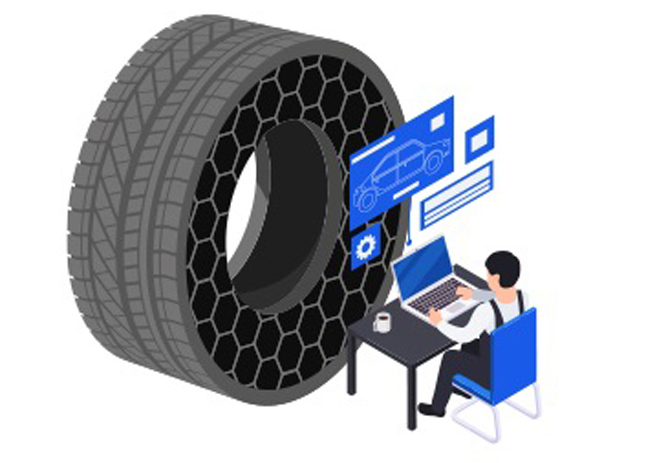Driving Sustainable Tire Innovation Forward
Accelerate the path to net-zero carbon with eco-friendly tires powered by the 3DEXPERIENCE® platform.
The Urgent Need for Sustainable Tires in the Mobility Industry
The pressure to reduce global carbon emissions by 45%1 by 2030 has pushed many mobility industry players toward urgent climate action. Tire manufacturers are no exception. As tires are essential to transportation, effective circular economy initiatives must be implemented quickly and for good reasons.
Over 1.6 billion2 new tires are produced yearly, with around 1 billion waste tires generated. The industry recycles only 100 million tires each year. Since tires do not decompose, they pose a real environmental threat by releasing harmful chemicals and greenhouse gases.
Enter the revolutionary sustainable tires. These smart tires – produced from sustainable materials and through green technologies – will tip tire manufacturers back onto the sustainability and enable them to achieve their commitment to producing tires made from 100% sustainable materials by 2050.
In our ebook, learn more about accelerating the path to sustainable tires in three easy steps powered by the 3DEXPERIENCE® platform.
Blazing a Green Trail in Tire Manufacturing
Reinvent next-generation sustainable tires with a digital-driven roadmap.
What Are Sustainable Tires?
Sustainable tires use fewer natural resources and are produced through energy-efficient processes. They are designed to lower rolling resistance, which means less engine power is required to rotate the tires, thus, emitting less carbon into the environment while increasing fuel efficiency.
Did you know?
About 200 raw materials go into a new tire. Sustainable tires cut down the use of raw materials with sustainable alternatives.
The 'magic triangle' – lower rolling resistance, better wet grip and wear resistance – are optimized in sustainable tires for energy efficiency.
Sustainable tires potentially reduce global fuel consumption from passenger vehicles by 5%3 to lessen the environmental impact.
The rising trend in Connected, Autonomous, Shared, Electric (CASE) vehicles pushes up per-vehicle utilization. This means tires in each vehicle will run an extended mileage and need to last longer than they can today. Sustainable tires' improved performance and durability can meet this challenge by extending tire use and minimizing replacements.
Key Features of Sustainable Tires
- High Recycled Content: Innovations in tire design are paving the way for new products to contain up to 80% recycled materials, drastically reducing waste and conserving resources.
- Energy-Efficient Manufacturing: By using less energy-intensive processes, manufacturers can significantly cut down CO2 emissions during production.
- Bio-Based Materials: Alternatives such as natural oils, silica from rice husks, and other bio-based materials reduce reliance on synthetic and petroleum-based inputs.
- Longer Lifespan: Improved durability reduces the frequency of tire replacements, leading to lower overall resource consumption.
- Fuel Efficiency: Eco-friendly tire designs, such as low rolling resistance tires, enhance fuel economy, further decreasing the vehicle’s carbon footprint.
Digitalize Complex Processes
Digital solutions can reduce global emissions by up to 20%4. An integrated digital approach in tire engineering with Dassault Systèmes' 3DEXPERIENCE platform enhances speed, reduces waste and explores renewable energy sources.
Circular Economy Initiatives From End to End
Collaborating on the 3DEXPERIENCE platform ensures circular goals are met throughout the tire's lifecycle.
For example, easy design space exploration, automation and integration of tools help reduce carbon footprint by accelerating validation time from days and weeks to mere hours while keeping designs accurate to minimize waste. In some cases, automated design creation from templates speeds up the tire design process by 15 to 30%.
In tire manufacturing, collaborating on the platform help manufacturers gain speed, transparency and efficiency to reduce carbon and waste across operations and the value network.

At 40%6, manufacturing is the top group identified in a study in need of improved collaboration.
A digital thread helps manufacturers ensure that whatever goes into a tire can be renewed or reused. Apart from closing the circularity loop from the start, other circular economy initiatives in tire disposal and recycling include:
Retreading
Worn-out tire treads are replaced with new ones to extend the life by up to 80%. This reduces the need for new tires, lowers cost and minimizes greenhouse gas emissions for a cleaner environment.
Pyrolysis
Heating tires in an oxygen-free environment to break down rubber in the oil and other components can lessen the environmental impact during disposal while generating economic value from the waste.
Extending recyclability value
Tire components can be grounded to crumbs and repurposed for other use, such as crumb rubber for construction projects. Chemical ingredients, such as vegetable oils, can be turned into biofuels, and quality carbon black can be derived for reuse in new tires.
As climate regulations tighten, sustainable tires will be on top of every tire manufacturer's net-zero carbon agenda. Getting a tight grip on circularity from end to end with the 3DEXPERIENCE platform can help tire manufacturers achieve their sustainability goals.
FAQ About Better Future Tires & Raw Materials
Related Content with Sustainable Tires Recycling
Circular Economy
How circular economy practices can help your business dare to be bold through new business models that preserve the environment for future generations.
Tire Manufacturers
Rising fuel and raw material costs, fierce competition, and stringent safety and environmental regulations are just some of the challenges facing today’s tire manufacturers.
Precision-Driven Innovation in the Tire Industry
Craft tire innovation excellence with the right integration and simulation strategy on the 3DEXPERIENCE® platform.
Life Cycle Assessment
Do more than measure your environmental impact: advanced digitalization helps companies achieve their carbon neutral goals by not only measuring their current environmental impact, but also the impact of future decisions.
